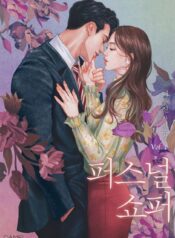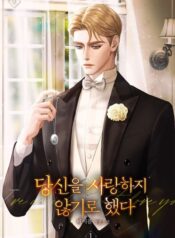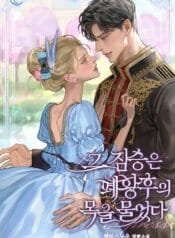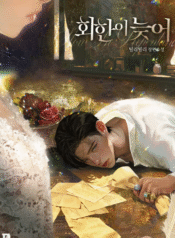It was an unrelentingly bleak day.
The sky was thick with clouds, as if snow could fall at any moment and cast the world in a dull, suffocating grey.
Breaking the silence that blanketed the land, two worn carriages crept along a narrow cliffside path.
The echo of hoofbeats reverberated down the empty road, which hadn’t felt the weight of travellers in quite some time.
From the second carriage, a man stepped down. His breath escaped in a long, white cloud as he looked out over the vast, empty field below.
The frost-hardened leaves beneath his boots crunched with each step.
“We can’t go any farther, Archbishop.”
There was a brief pause from within the carriage.
The man stood still, his eyes fixed on the shadowed grassland below, waiting for an answer.
“Proceed anyway.”
The command came at last — calm but resolute.
For a moment, the man stood frozen, taken aback.
“Understood. We may need to walk part of the way.”
“I don’t mind.”
He nodded quietly to signal to the coachman to continue, then returned to the carriage he had been riding in.
Opening the door, he frowned at what he saw inside.
“What are you wearing? What if the lady sees it and takes offence?”
Inside, a woman sat looking worn and weary. Beside her sat a young girl who quickly lowered her gaze, sensing the tension.
Clutching a fine shawl tighter around her shoulders, the woman shot the man a glare.
“It’s freezing – I had no choice. It’s not like the lady needs it right now.”
Her retort was sharp, and though the man opened his mouth to respond, he quickly held back.
She had a point — the lady probably had more important things to worry about than a shawl.
The carriage pressed forward into suffocating darkness so dense that not even the path ahead could be seen.
Suddenly, the horses pulling the lead carriage reared back, whinnying and lashing out.
“What’s happening?”
The woman in the second carriage pulled the child close and wrapped the shawl tightly around them both, startled by the commotion.
Their own horses began to panic, causing the carriage to lurch violently.
The man’s face paled as he threw open the door.
“Something’s wrong with the first carriage. I’ll go and check it out.”
He stepped down quickly but slipped and tumbled back inside.
His eyes widened as the sound of falling rocks and crumbling earth echoed from the cliffside.
“D*mn!”
For a moment, he thought the chaos had passed.
But then came a deafening roar.
The entire mountain seemed to shudder, and his ears rang from the impact.
He was about to rush out again when one of the horses suddenly bolted, slipping on the icy slope.
Ahead, the road dropped steeply downhill.
Crash! Boom!
An earsplitting crack split the silence. Before he could react, the lead carriage disappeared, swallowed whole by the crumbling edge of the path.
The frozen path had collapsed, sending the carriage plummeting into the abyss.
There was nothing he could do.
His own carriage was next.
The ground gave way beneath them.
Pain exploded through his body as he was thrown violently against wood and iron, his limbs being crushed in the process.
He squeezed his eyes shut, his breath caught in his throat.
At the very edge of the cliff, not a speck of dust stirred as death opened its jaws wide.
He heard the sound of his bones breaking.
Then—darkness.
Silence followed, deep and unnatural.
It was as if none of it had ever happened.
In that frozen stillness, a child’s cry rang out — sharp and raw, like a scream.
This was followed by the piercing wails of another child.
But no one came.
Snow began to fall — thick, heavy and relentless.
Tearing through the night sky, it covered the broken wreckage in a cold, white shroud.
It buried it all as if to erase every trace of what had just occurred.
Eighteen years later.
There’s a saying: “Spring arrives first at the Schützmann estate in the Barón Cohen Empire.” And indeed, the Schützmann family’s townhouse lived up to its reputation.
Around the lake, countless flowers were in full bloom, all arranged for a single evening’s ball. It was said that the cost of the fresh flowers—used only for that night—was equivalent to the annual salary of a low-ranking priest.
By that standard, few places were more fitting to host a lavish soirée than this grand residence.
Now twenty-five, the young Duke Robert Ian Schützman regularly hosted invitation-only gatherings at the townhouse, located in Heitzfield—the most expensive district in the empire’s capital.
While many historic estates in the countryside lacked dedicated ballrooms, such grandeur was only expected in the city mansion of the empire’s wealthiest young noble.
Duke Schützman was the son of Josephina, the emperor’s sister—currently the most powerful woman in the empire.
The emperor himself had been in poor health since a relatively young age. Worse still, the crown prince Jefferson—the empress’s eldest son and heir to the throne—had recently died of a mysterious illness.
Though the emperor had another son by a concubine, the child was still barely able to walk.
With no strong figure left to anchor the imperial family, power had naturally begun shifting toward House Schützman.
And the more unstable the empire became, the livelier the Schützman townhouse grew with music, laughter, and celebration.
From the entrance hall to the salon, the music room to the long gallery, every space was brimming with nobles.
Ironically, the host of these opulent events remained sequestered in his office, emerging only to offer a polite greeting at the start and close of each gathering.
Yet no one criticized him for this.
Simply opening his doors and allowing the empire’s most powerful figures to gather under his roof was more than enough—enough to silently but steadily secure his place as the empire’s future ruler.
By the lakeside, where the air was thick with the scent of spring, Henrietta stood motionless. Across the water, a group of finely dressed women—more lavishly adorned than even the flowers—were choosing boats for a ride across the lake.
For Henrietta, the only way to pass the time was to quietly guess which boat each of them would pick.
It was a beautiful scene, yes—but one that had nothing to do with her.
Even so, she had no choice but to remain exactly where she was.
“Miss Henrietta.”
At the sound of the familiar voice behind her, Henrietta had to make a conscious effort not to let her expression sour.
Forcing a polite smile to her lips, she slowly turned around.
“Good afternoon, Lady Janice Bryan.”
Janice, the only daughter of the Count of Bryan, had spent her entire youth tirelessly vying for the attention of the empire’s most eligible bachelor.
And her long campaign had not been in vain. Rumors already circulated among the young ladies of society that she was destined to become the next Duchess Schützman.
“You’re working hard as always.”
At some point, Janice had begun acting as though she were already the mistress of the Schützman household, treating every servant as if they were under her command.
Henrietta, as the family’s private tutor, was no exception.
“Oh, it’s nothing. I’m simply doing what’s expected of me.”
Henrietta answered with the kind of faultless professionalism expected of a hired servant.
Duke Schützman had a twelve-year-old nephew named Grayson.
His sister, married to the eldest son of the powerful southern Caden family, had wished for her second son to be raised not in the countryside, but in the capital.
Robert had readily agreed to take the boy in.
Henrietta had entered the household when Grayson turned seven, and for the past five years, she had served as his literature tutor.
In other words, Janice’s underlying hostility toward Henrietta had lasted just as long.
A beautiful, unmarried young duke and a poor, young governess. It was the perfect recipe for gossip, too tempting for busybodies to resist.
Perhaps it couldn’t be dismissed as mere rumor either, as traces of unspoken exchanges between the two lingered in quiet corners of the household.
Even though nothing had ever been openly revealed, Henrietta had to brace her back with deliberate strength just to keep her posture straight.
“Where is Young Master Grayson?”
“He went for a walk with some of the other gentlemen.”
“Oh, how lovely. It’s about time he started stepping away from a lady’s skirts, after all.”
The meaning behind her words was unmistakably clear.
In the empire, noble boys were allowed to study freely—whether at home or at private academies—until the age of twelve.
But once they turned thirteen, it was customary for them to enroll in a public imperial school. Janice was clearly suggesting that Henrietta should start preparing to leave this household.
It was only spring, and three seasons still remained—but the dismissal came early.
“You’re absolutely right.”
Henrietta responded with a soft smile. She hadn’t said anything that could be considered rude, so she assumed that would be enough for Janice to take her leave.
But instead, Janice spoke again.
“Since young master Grayson isn’t here, Miss Henrietta, why don’t you join us for a boat ride?”
“…I beg your pardon?”
Henrietta stiffened, startled by the unexpected invitation.
Something was off—something had clearly changed in Janice’s demeanor.
Henrietta sensed it immediately, but she couldn’t let it show.
“I’m afraid that might be difficult, my lady, I’m not sure when young master Grayson will be returning.”
Her refusal was as courteous as possible. Even so, Janice didn’t retreat.
With a tilt of her head and a smile that feigned innocence, Janice held her ground. The women standing beside her exchanged glances, their faces bright with anticipation.
And just like that, Henrietta’s gentle resistance was swept away by Janice’s unyielding persistence.






